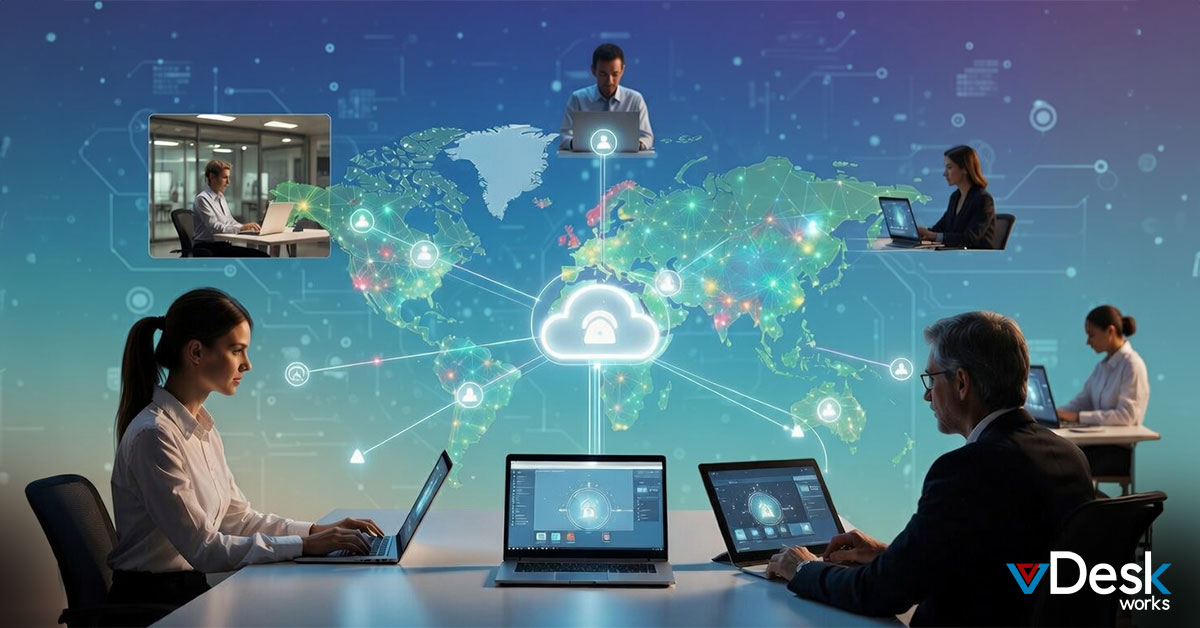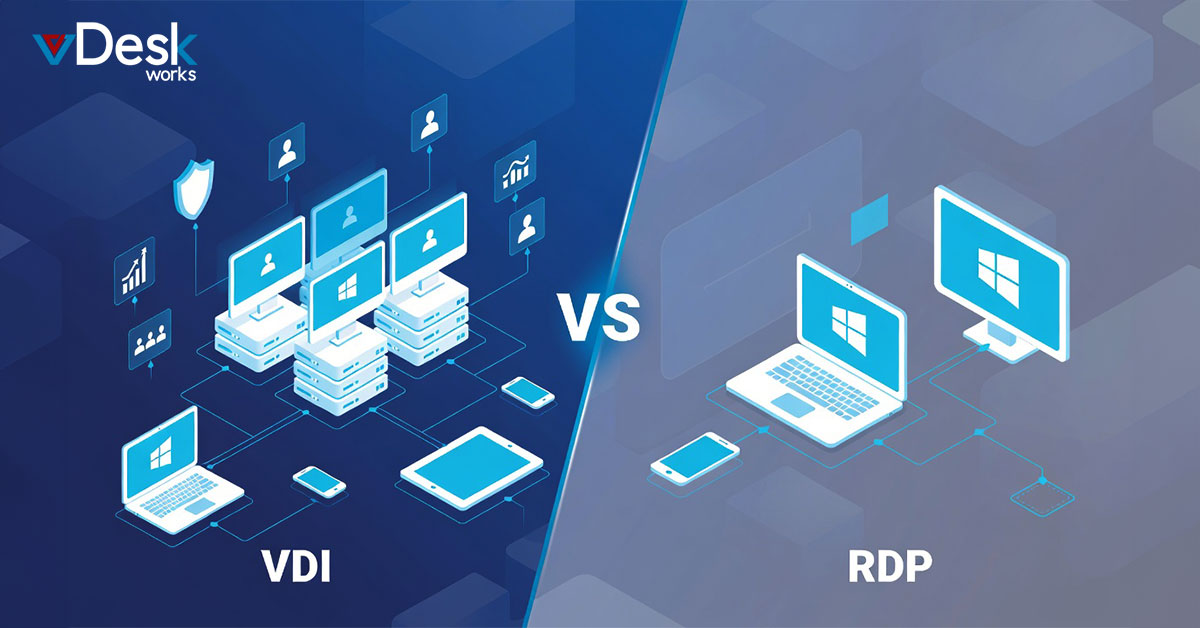Within the constantly changing world of working from home and protecting data, Virtual Desktop Infrastructures (VDIs) have become the main choice, ahead of Virtual Private Networks (VPNs) in 2024. As companies all over keep adjusting to difficulties brought by working remotely, there is a strong need for powerful methods to protect important data and ensure work continues smoothly without interruption. VDIs have changed the game in this area because they are very modern and have new functions.
Introduction to VDIs and VPNs
Virtual Desktop Infrastructure (VDI) entails the utilization of a virtualized desktop environment housed on a distant server, thereby granting users the ability to retrieve their customized desktops, applications, and data from any internet-connected device. Likewise, Virtual Private Networks (VPNs) establish impervious and confidential connections across potentially vulnerable networks such as the Internet, empowering remote users to obtain resources on a secluded network as if they were physically situated within it.
Features of VDIs
VDIs provide many functions that improve security, make work more flexible, and increase efficiency for people working from a distance.
Central Management
VDIs allow IT managers to control desktops, applications, and security rules all from one place, which makes setting up and maintaining systems easier.
Improved safety
Sensitive information stays kept in the data center when using VDIs, which reduces the chance of losing data or having security issues with devices at the endpoint. Stronger protection comes from adding encryption methods and control for access.
Scalability
VDIs can grow easily, letting companies add more virtual desktops quickly to meet changing work amounts or business needs.
Enhanced recovery from disasters
When hardware breaks down, or natural events occur, virtual desktop interfaces maintain the flow of work by giving people access to their computer screens and programs from different devices.
Advantages of VDIs over VPNs
VPNs are usually for remote access, but VDIs give different benefits like better data protection and help people work from far away more easily.
Data Separation
Unlike VPNs that allow entry to the whole company network, VDIs offer individuals separate virtual spaces, reducing the chance of not allowing entry into confidential information.
Virtual Desktop Infrastructures follow a zero-trust security approach, where users must prove who they are and comply with tight access rules before using resources. This helps prevent threats from both inside and outside the organization.
User experience
VDIs give a smooth and same user feeling over different devices, with little delay and little loss of performance. They ensure that people working from afar keep their productivity without losing out on how well things work.
VDIs assist companies in meeting regulatory compliance by applying security policies, using encryption rules, and taking steps to protect confidential data.
Cost efficiency
VPNs often need large infrastructure investments and continuous maintenance expenses, but VDIs can save money because they use virtual technologies and services from the cloud.
Comparison for Flexibility
In terms of flexibility, VDIs offer several advantages over traditional VPNs:
Application Compatibility
VDIs can handle many applications, like old programs and software made just for one company. They do this without needing extra setup or having the common problems that VPNs have with compatibility.
Resource Use
VDIs make better use of computer resources by giving out these resources as users need them. This ensures the system works very well and can handle more if needed, unlike VPNs that might have problems with insufficient bandwidth or too much traffic on the network.
Workload Mobility
VDIs allow users to move their workloads easily, allowing them to reach their virtual desktops and applications from different places without being limited by network connections or geographical limits that VPNs might set.
Scope in the Future
As we look to the future, more companies are expected to start using VDIs because they want to keep data safe, make working from home better, and help their business be more able to change quickly.The main things that will push the growth of VDIs include:
Hybrid Work Environments
As hybrid work models become more common, Virtual Desktop Infrastructures are becoming very important to help people collaborate smoothly and stay productive even when their team is spread out in different places.
Edge Computing Integration
VDIs will become more combined with edge computing technologies to provide desktop experiences with low delay and high efficiency, which is especially important for applications needing quick response times and processing data in real-time.
When put together, AI and automation will improve how we can predict things with analytics in VDIs. They also improve our systems' safety and allow them to fix themselves. This means we can find dangers early on and sort them out before they cause problems.
Virtual Desktop Infrastructures will keep improving to give users a more engaging and tailored experience, using virtual reality and augmented reality technologies to change how people engage with virtual desktops.
vDesk.works' Cloud VDI Solution
Setting a New Standard in Remote Work
vDesk.works' Cloud VDI Solution is a leader in the virtual desktop infrastructures field, providing many features and functions to improve remote work situations. vDesk.works distinguishes itself by focusing on giving users an effortless and safe experience while ensuring great performance that can grow as needed.
With vDesk.works, companies can use cloud computing to create virtual desktops when needed, avoiding the expense of buying a lot of hardware and setting up complicated systems. The easy-to-use control panel lets IT managers set up, watch over, and handle these virtual desktops and apps from one place easily, which makes things run smoother and cuts down on costs.
Furthermore, vDesk.works emphasize security across all areas by using strong encryption methods, multiple steps for user verification, and detailed permissions management to protect important information and decrease the chance of cyber attacks. The zero-trust model it uses ensures that only people with permission can use company resources, reducing the possibility of unwanted entries or data leaks.
Besides its safety functions, vDesk.works' Cloud VDI Solution offers great adaptability and the ability to scale. This allows companies to adjust easily when business needs change or work demands grow. It is helpful for remote workers, supports Bring Your Device programs, and assists with disaster recovery plans, giving organizations the capacity to succeed in a constantly changing business environment.
The Cloud VDI Solutions from vDesk.works changes how we think about remote work systems. It gives a complete and safe option that can grow with the company, helping businesses make the most out of working remotely and ensuring they stay productive and efficient and keep their data protected.
The Bottom Line
To sum up, VDIs are now the chosen method to solve problems with data protection and remote work that companies meet in 2024. Because they have better functions, stronger security, and more adaptability than VPNs, VDIs are ahead. They provide a way for safe and effective remote working today and going forward.


 Emma Carson
Emma Carson
















